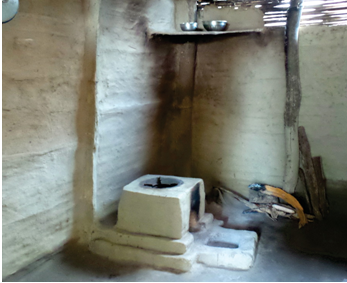Women for Women Empowerment: Women's Network in Dumre, Khotang
 |
|
Rocket stove built and promoted under WEE-Nepal Project
|
This case study is developed
based on our interaction with Ms.Tulasa
Ghimire who is a resident
of Deurali Danda,
Dumre Dharapani Village
Development Committee (VDC) in Khotang District. She is also the Chairperson of a local Women's Group and the ICS Development Committee (IDC) of Dumre VDC. This committee has been set up
at the village
level to support
the promotion of ICS and
is independent of the WEE Nepal project.
The IDC is an upshot of the community members'
resolution to make the village Indoor Air pollution (IAP)-free. Eye irritation, headache and other respiratory problems were common health
problems in the village, which
the villagers believed were attributable to the
smoke emission from
their old cook
stoves. This led them to form
a committee and get involved in Improved Cook Stove(ICS) promotion and development in the VDC.
Tulasa admits that in the early days of the IDC, she was not sure about getting villagers to believe
in the benefits of stove, the ICS promoted
under the WEE Nepal Project. She
stated 'Getting people to
pay for a
stove is c h a l l e n g i n g p a r ti c u l a r l y because, many people in rural areas are still not familiar with the idea of paying for cook
stoves, especially mud stoves'. However, with perseverance and
abundant support from her family
and other committee members, Tulasa and her team of nine members have been successfully convincing the potential ICS users
about the benefit
and the need for ICS in the village.
Her organization has received support from different quarters to materialise the ICS for the government's indoor air pollution free project. According to Tulasa “Potential stove owners have supported the project also by providing labour to make bricks and to gather locally available raw materials required to build the stove'. Tulasa also acknowledges the support provided in different forms by Mr. Kiran Bhattarai (VDC Secretary), Mr. Ramesh (a stove promoter), local political party representatives and local community-based organizations in making the stove project a success in their VDC. She expresses gratitude to the VDC Secretary,“He has helped in building alliances at local level, book-keeping and maintaining accountability, and in convincing potential stove users to deposit Rs. 500 and register at the VDC office and distributing the due subsidy following the installation.”
The stove project is implemented through market-based approach with subsidy support from the VDC. Tulasa and her team promote the use of improved cook stove and aid ICS-related information flow from concerned agencies to the potential users and stove masters. They do not sell nor install the stoves but support in keeping an inventory of the users at the VDC. The stove masters charge Rs. 700 for their services. Of the total cost, a stove owner pays Rs. 500 and the rest is funded by the VDC.
'Sustained use of stoves and hence the sustainability of the stove program are my primary concerns' states Tulasa. According to her, the village had once run a campaign to make itself an open defecation-free area. In order to accomplish this, toilets were built in all houses. However,to this day, not everyone uses toilet and many still practice open-defecation. 'In order to avoid this from happening in the stove project', she claims 'my team pays regular visit to ICS owners, and solicit feed backs from them on various aspects of ICS. Some users are used to the smoke and plenty of flame, and they often complain feeling uncomfortable to cook on ICS'. Tulasa emphasizes that she and her team members will educate stove users about the long-term health implications of smoke, which she believes is necessary to ensure the adoption and sustained use of ICS.
The WEE Nepal Project liaises with and has garnered support from local women's agencies. Networking with local agencies (such as the one that Tulasa is associated with) is an integral element of the project's exit strategy. This strategy is important for ensuring the sustainability and ownership of the project vision by local community. The crucial role of women as agents for local changes is well exhibited by Tulasa and her Team.

Comments
Post a Comment